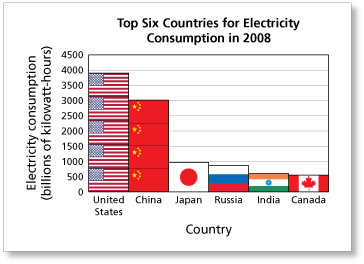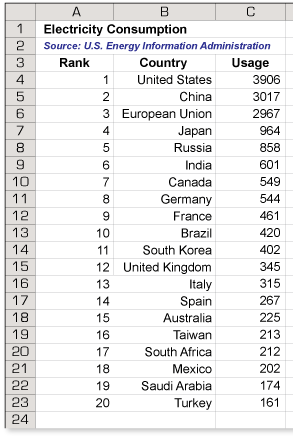-
Use the graph to estimate the electricity consumption of the United States. Round your answer so it is reasonable for the context. (See Example 1.)
-
From the graph, you can estimate that the consumption of electricity in the United States (in 2008) was about 3900 billion kilowatt hours.
3,900,000,000,000 kilowatt hours
Download the spreadsheet of data to determine the actual amount of electricity consumed by the United States in 2008. Was your estimate close?
Comments (1)These comments are not screened before publication. Constructive debate about the information on this page is welcome, but personal attacks are not. Please do not post comments that are commercial in nature or that violate copyright. Comments that we regard as obscene, defamatory, or intended to incite violence will be removed. If you find a comment offensive, you may flag it.
When posting a comment, you agree to our Terms of Use.Showing 1 commentsSubscribe by email Subscribe by RSSGuest 2 years ago |3,900,000,000,000 kilowatt hours0 0 -
-
Estimate the total electricity consumption of Japan, Russia, India, and Canada. Is it greater than or less than the electricity consumption of the United States? (See Example 1.)
These comments are not screened before publication. Constructive debate about the information on this page is welcome, but personal attacks are not. Please do not post comments that are commercial in nature or that violate copyright. Comments that we regard as obscene, defamatory, or intended to incite violence will be removed. If you find a comment offensive, you may flag it.
When posting a comment, you agree to our Terms of Use. -
In 2008, the population of the United States was about 304 million. Use the graph to estimate the amount of electricity consumed per person. Round your answer so it is reasonable for the context. (See Example 1.)
-
To estimate the electricity consumption per person, divide the consumption by the population.

In 2008, the U.S. electricity consumption was about 13,000 kilowatt-hours per person.
Calculator Hint:
When entering numbers like these into a calculator, you can save keystrokes by dividing out the same number of zeros from the numerator and denominator.

These comments are not screened before publication. Constructive debate about the information on this page is welcome, but personal attacks are not. Please do not post comments that are commercial in nature or that violate copyright. Comments that we regard as obscene, defamatory, or intended to incite violence will be removed. If you find a comment offensive, you may flag it.
When posting a comment, you agree to our Terms of Use. -
-
In 2008, the population of Canada was about 33 million. Estimate the amount of electricity consumed per person. Which country consumed more electricity per person, Canada or the United States? (See Example 1.)
These comments are not screened before publication. Constructive debate about the information on this page is welcome, but personal attacks are not. Please do not post comments that are commercial in nature or that violate copyright. Comments that we regard as obscene, defamatory, or intended to incite violence will be removed. If you find a comment offensive, you may flag it.
When posting a comment, you agree to our Terms of Use.Showing 2 commentsGuest 2 years ago |guest0 0Guest 2 years ago |NARYM0 0 -
Two refrigerator models and their annual electricity consumptions are shown. Assume the price of electricity is $0.1202 per kilowatt-hour (kWh). (See Example 2.)
- Estimate the annual electricity cost of each model.
- How much money will you save in electric bills each year if you buy the top-freezer model instead of the side-by-side model?

-
-
To estimate the annual electricity cost, multiply the usage by the cost.

- You will save about 76 - 64 = $12 a year in electric bills.
-
These comments are not screened before publication. Constructive debate about the information on this page is welcome, but personal attacks are not. Please do not post comments that are commercial in nature or that violate copyright. Comments that we regard as obscene, defamatory, or intended to incite violence will be removed. If you find a comment offensive, you may flag it.
When posting a comment, you agree to our Terms of Use. -
Two refrigerator models and their annual electricity consumptions are shown. Assume the price of electricity is $0.1202 per kilowatt-hour (kWh). A top-freezer model with an ice dispenser consumes 90 kilowatt-hours per year more than the standard top-freezer model. (See Example 2.)
- Estimate the annual electricity cost of the top-freezer model with the ice dispenser.
- How much does the ice dispenser add to the annual electricity cost of the top-freezer model?

These comments are not screened before publication. Constructive debate about the information on this page is welcome, but personal attacks are not. Please do not post comments that are commercial in nature or that violate copyright. Comments that we regard as obscene, defamatory, or intended to incite violence will be removed. If you find a comment offensive, you may flag it.
When posting a comment, you agree to our Terms of Use. -
Two refrigerator models and their annual electricity consumptions are shown. Assume the price of electricity is $0.1202 per kilowatt-hour (kWh). Your current refrigerator consumes 700 kilowatt-hours per year and should last about 7 more years. (See Example 2.)
- How much will your current refrigerator cost you over the next 7 years?
- How much would the top-freezer model cost you over the same time period?
- You buy the top-freezer model for $549.99. Will the difference in electricity costs over the next 7 years cover the price of the new refrigerator? Explain.

-
- Your current refrigertor will cost about

This is about over the next 7 years.
over the next 7 years. -
From Exercise 5, the top-freezer model would cost about

over the next 7 years.
-
The difference in the costs of electricity during the 7 years is only about $140. By itself, this does not justify getting rid of your current refrigerator and buying a more efficient model. On the other hand, when your current refrigerator quits working in 7 years, it would be good to consider buying the more "planet friendly" model.
- Your current refrigertor will cost about
These comments are not screened before publication. Constructive debate about the information on this page is welcome, but personal attacks are not. Please do not post comments that are commercial in nature or that violate copyright. Comments that we regard as obscene, defamatory, or intended to incite violence will be removed. If you find a comment offensive, you may flag it.
When posting a comment, you agree to our Terms of Use. -
Two refrigerator models and their annual electricity consumptions are shown. Assume the price of electricity is $0.1202 per kilowatt-hour (kWh). You own the top-freezer model. Suppose the price of electricity decreases to $0.12 per kilowatt-hour. How much will you save in electric bills each year? (See Example 2.)

These comments are not screened before publication. Constructive debate about the information on this page is welcome, but personal attacks are not. Please do not post comments that are commercial in nature or that violate copyright. Comments that we regard as obscene, defamatory, or intended to incite violence will be removed. If you find a comment offensive, you may flag it.
When posting a comment, you agree to our Terms of Use.








